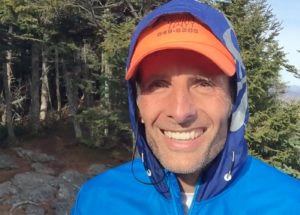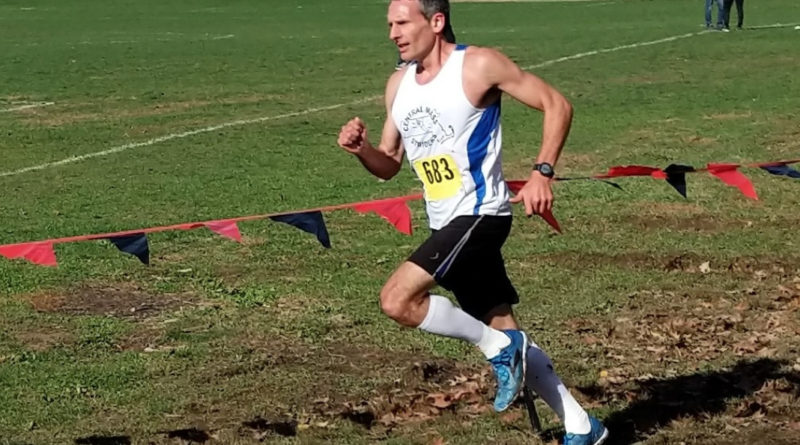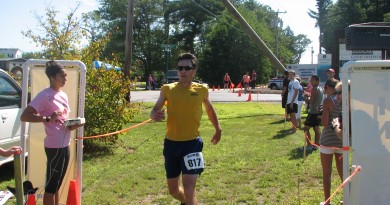The Compassionate Coach
Name: Tim Van Orden Age: 51 Lives in: Bennington Profession: Coach, speaker, author of Running Raw and Compassionate Primary Sport: Running, trail running and snowshoeing
Tim Van Orden’s priorities have changed. The four-time U.S. Master Runner of the Year wrote a book, “Running Raw” and used to proselytize a raw vegan diet as a way for his coaching clients to meet their goals. Now, through his business Compassionate Coaching, his focus is for those clients to change their lives one day or one moment at a time.
Van Orden grew up in Vermont, but it was his time in Los Angeles that gave him an appreciation for the trail running for which he is now known. And in August, 2019 at age 50, Van Orden set the American road record in the mile for his age group, running the distance in 4:46.
In addition to setting a road mile record for your age, in 2019 you won the U.S. Masters Mile Championship, the Half Marathon Trail Championship and the silver medal in the U.S. Snowshoe Championships. What are you most proud of?
There are a couple of ways that I evaluate a race. There is the value you put on a race leading up to it, what happens when you get your result and then how you tell the story about it afterwards. Competing in New England is very different: Here people want to know who else competed, and if strong racers didn’t show up it’s considered a soft win. The important races are the ones where everyone showed up and you still won.
A race that stands out to me was the U.S. Trail Championship 10K in North Carolina in 2010. I had already won the 15K but there wasn’t that much competition and in the 10K, I won against people I’d never beaten, so to win that race meant the most to me.

Another race I’m proud of is one that isn’t any kind of championship and doesn’t even have an awards ceremony. It’s the Escarpment Race in the Catskills and it covers 18 miles with at least three full mountains. It’s nearly impossible to finish the race without getting hurt because there are roots, rocks and steep drop-offs. I had avoided it while I concentrated on titles but when I turned 50, I decided to try it because it’s like a Vermont trail. It humbled me in ways I didn’t expect. In 2018, I broke the masters’ course record and finished seventh. In 2019, I shaved off another minute and finished sixth.
I’m also proud of my 2019 road mile record because it was one of those races where competing is 50-percent physical and 50-percent about sheer force of will.
Were you always athletic?
I ran in high school and a little bit at Middlebury College but I could never commit to the training. I have some natural talent but I never got to the level I had hoped I would. A few friends that I competed with were selected for Olympic teams because they worked hard and put in the time, but around age 19 or 20, I decided to leave athletics behind me and do something else.
How did you transition into becoming an actor?
My junior year at Middlebury was when I stopped being an athlete and I also decided to change my major. I was painfully shy so I took acting and dance classes. My senior year, my professor said I was fun to watch from the first row but everyone sitting further back was missing the performance so I should look into film instead of theatre.
It took me seven more years to get the nerve to move and in the interim I was the ski coach at Mt. Anthony Union High School in Bennington. I got to L.A. in 1998 but I never really had a breakthrough because shyness doesn’t get you very far. I did a lot of voice-over work and some commercials but there wasn’t a whole lot of time on camera.
How did you like Los Angeles?
I thought I would hate L.A., but I knew I had to try it. It turned out that I was blown away by the nature that is adjacent to the city. The parks and the mountains and canyons are right there, so I’d bike or run to the trails and that’s how my athletic career reinvented itself.
How did you get back into running?
I started running again at age 38 just out of curiosity to see what I could do on a raw vegan diet and to see if I had any talent left in the tank. I learned that what had stopped me from putting in the effort in my teens was depression, but I hadn’t known it then. When I came back to Vermont in 2007, I saw the state differently because when I was younger, I didn’t spend a lot of the time in the mountains. When I trained in high school, I ran on the road, but L.A. opened me up to running on trails. Now that I am back, I realize Vermont is such an extraordinary place to be a trail runner or snowshoe racer and I’ve fallen in love with it. It’s a very different place for me now.
Where do you train now?
There are so many amazing trails within 10 miles of Bennington but since I often run several times a day, I have a 30-mile radius that includes Manchester, Wilmington, and Adams, Mass.
Congratulations, too, on being part of the 2019 U.S. Snowshoe National Masters Team. When did you start snowshoe racing?
When I came home from California in 2007 I thought about getting back in to Nordic ski racing, but it is a very different sport from when I raced in the 80’s and it would have cost at least $3,000 to get outfitted. I still love Nordic skiing, but I couldn’t justify the expense if I was just trying it out. Dave Dunham, a running mentor, suggested snowshoe racing. It sounded like drudgery, but he lent me a pair of shoes and I did my first race in 2008. It was the Brave the Blizzard 5K in Albany. It was the hardest thing I’d ever done and I loved every minute. I’ve been hooked ever since.
There’s something about it—the quiet, the camaraderie—it’s unique in running sports in that something like a peloton develops. People can draft off one another and they take turns breaking trail. There is an ethos of helping one another which makes it a very Vermont kind of sport.
The snow conditions change constantly and you can get snow in the middle of the race or a foot the morning of the race after the course has been set and suddenly you’re in untracked snow. You have to take turns breaking trail and you get a peloton forming behind the people taking the lead so you might get a sprint to the finish with 40 people. Sometimes conditions are so difficult that everybody stops. It’s something that for me feels like Vermont. That’s why it’s become such big part of what I do.
You’ve also been named U.S. Masters Runner of the Year four times, for trail running and for mountain running.
One of the things I love about being older is that you can put these goals on the horizon. I never imagined I’d get those honors because I didn’t know they existed. When I was on my soapbox about “Running Raw” [Van Orden’s audiobook on his raw vegan diet] a lot of people gave me flack and I wanted to show that the diet worked so I needed real data. I remember my first trail running championship in 2010.
I cried while crossing the finish line because I felt vindicated but afterwards nothing had changed. I felt hungry and tired and had to return my rental car. I’ve won 17 U.S. titles, mostly masters, but some overall and none of them have changed my life. I set the American road record for my age group in the mile last August in Flint, Mich. and that didn’t change my life.
What led you to found Compassionate Coaching?
Compassionate Coaching evolved from Running Raw which is a project I started in 2005 when I was living in Los Angeles. We live in a really interesting time and one can find oneself in the midst of an unanticipated career that makes no sense looking forward but does in hindsight. I started Running Raw as a mission to show that you could find significant advantages by being on a raw vegan diet and it morphed into the idea that anyone can achieve a high level of fitness if they desire to. The project involved dietary and training advice and included an audio book and videos. Running Raw was ideological and dogmatic and in hindsight, it was a bit naïve. I got off my soapbox when I started meeting people where they were and seeing what they wanted. I wanted to show that you can improve significantly without a nose to the grindstone, no-pain/no-gain mentality.
Can you explain how that works?
As I was becoming a vegan I was introduced to Buddhism. Their idea of compassion is quite a bit different from the way many Americans may define the term. It is more grounded and honest and about working within the winters of your life, by which I mean the more difficult times. This has been an evolution for me that started with veganism and then expressing myself as an athlete and finally realizing I could take these principals and apply them to my own goals as an athlete. As I developed a reputation, people began to reach out for coaching and I realized this philosophy could be valuable for others.
A lot of people who reach out to a coach have a particular goal like losing weight or finishing a race. That’s all well and good but what is more valuable is creating a sustainable lifestyle. That’s how Compassionate Coaching evolved. It’s a non-intuitive process of life improvement.
How can that approach help?
People think their accomplishments will change their lives once and for all, but once you lose that weight or finish that marathon, you’ve met your goal but you haven’t really changed your life.
The only thing that changes your life is learning to live each day and each moment differently. People should find a way to make each day or moment count. We get so tight and strict and we feel that we have to do things. That’s what’s changed my life—the process that lets me get those results. It’s who you have to become on a daily basis that matters and that’s easier to do than people think.
Featured Photo: Tim Van Orden is shifting his coaching philosophy and setting new running records. Photos courtesy Tim Van Orden
Tim’s Go-To Vegan Meals
The morning of a race I eat very simply. I generally have a smoothie or oatmeal and not a lot because when you are nervous you don’t digest well. Regarding protein, there is a lot of disinformation out there. The truth is that there is protein in almost everything you eat and as long as you consume enough calories, you get enough protein.
Green Smoothie
Banana
Half cup frozen blueberries
5 big leaves of kale (torn off major stems)
6 big medjool dates OR 3 tablespoons maple syrup
1 tablespoon chia seeds
2 cups of water
Salad
1 head red leaf lettuce (chopped small in both directions)
1 head romaine lettuce (chopped small in both directions)
1 medium carrot (grated)
5 radishes (grated)
1/2 beet (grated)
1/2 cup garbanzo beans
1/2 cup brown rice pasta
(Mix all ingredients together thoroughly)
Dressing
2 tablespoons Olive oil
1 teaspoon Coconut aminos
2 tablespoons Apple cider vinegar
2 tablespoons Nutritional yeast
1 Tablespoon Maple syrup
(Mix or shake thoroughly, then toss with salad)



